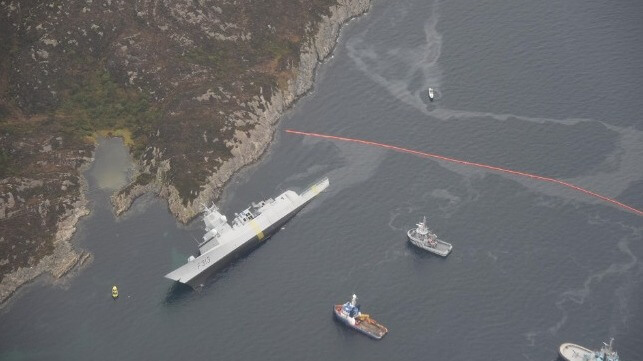CO of Lost Norwegian Frigate Faults Tanker for Collision

The officer of the watch on the ill-fated frigate KNM Helge Ingstad's final voyage has been charged with negligence in connection with the ship's loss, and the trial is bringing out spirited differences of opinion on seamanship and command responsibility. The vessel's commanding officer contends that the tanker that Helge Ingstad struck was at fault because it was navigating outbound on the near side of the fjord; the pilot of the tanker insists that the route was standard practice, and a prudent choice.
The frigate Helge Ingstad collided head-on with Sola TS off the Sture oil terminal in Norway's Hjeltefjord on November 8, 2018. Despite attempts to keep her afloat, she gradually sank on a rocky, sloping seabed near the terminal. All crew safely escaped, and no major injuries were reported. She was finally refloated, but the damage from saltwater immersion was so extensive that the Norwegian Navy decided to scrap her.
As the Ingstad approached the Sture oil terminal that night, headed inbound on the Hjeltefjorden, Sola TS was just leaving. The tanker unmoored from the pier and maneuvered to head outbound, keeping to the near (port) side of the channel. The tanker had her deck lights on, as was common practice, and the bridge team aboard the Ingstad thought that the Aframax was part of the oil terminal. Ingstad continued to make way on an intercept course with this "land" target at 17 knots. No marine pilot was aboard to advise the frigate's bridge team, and the ship was running with AIS turned off.
Aboard the Sola TS, the pilot - a 15-year veteran of the trade - spotted Helge Ingstad's lights when the frigate was still four nautical miles out. "I understood that it would become a close situation if it continued like this," he told the court.
Since Ingstad was not broadcasting AIS, the pilot did not know the oncoming vessel's name. He attempted to make contact with the unknown ship three times, without success - even after using a signal lamp - so he asked the VTS service to help identify the target.
After several calls, the VTS operator identified the target as the Helge Ingstad, and the pilot finally got a response - but not timely action. Helge Ingstad's bridge team acknowledged the pilot's final warning to turn, but they maintained course and speed until it was too late. The frigate and the tanker collided; Helge Ingstad was badly damaged, and as attention turned to saving lives and equipment, it would be hours before the warship's crew learned that the object that they had struck had been a ship.
Norwegian warship ''Helge Ingstad'' navigating by sight with ALS turned off, crashing into oil tanker, leading to catastrophic failure. Video from 2018, court proceedings ongoing. ???? pic.twitter.com/K9m5O9NuMd
— Public Outsider (@publicoutsider) January 31, 2023
The commanding officer of the Helge Ingstad took the stand last week to defend his watch officer and take responsibility for the outcome, since the lost vessel had been under his ultimate command. He also critiqued the navigation of the Sola TS.
"If it is true that it is normal for tankers to go on the port [west] side of the [fjord] out of there, I think it is hair-raising. It is not on the [chart]. There is nothing to indicate that," said CO Kommandørkaptein Preben Ottesen. "When it's not on the [chart] and they still don't inform everyone about it, I think it's very reprehensible."
In court, the Sola TS' pilot asserted that it was expected for tankers to head outbound along the west side of the fjord, since this was the shortest route to open water. "Those who say otherwise have no idea," he said.

that matters most
Get the latest maritime news delivered to your inbox daily.
He added that "should not be possible" for the Ingstad's bridge crew to have mistaken the tanker for something else, even if Sola TS had her deck lights on. "I have seen hundreds of oil tankers with deck lighting. I have never heard of ships being in doubt that it is a ship. This is the first time I have heard of this," he said.
The Helge Ingstad bridge team also contended that they never saw the tanker's navigation lights or the signal lamp. Asked why this might be, the pilot simply responded that "there was a lot they didn't see on that bridge there."
